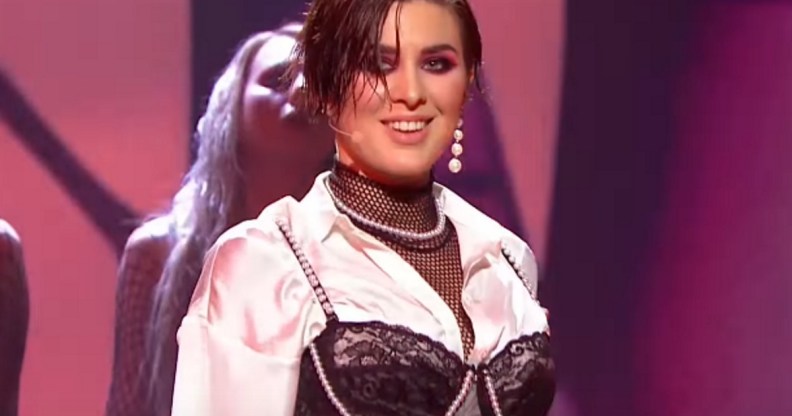Ukraine bans its own Eurovision contestant Maruv from competing

Maruv will not be able to compete at Eurovision after negotiations between her and the Ukrainian broadcaster broke down (UA:PBC/youtube)
Ukraine has stopped its 2019 Eurovision Song Contest entrant, Maruv, from taking part after the singer refused the national broadcaster’s “political” terms.
The country’s state-funded broadcaster, UA:PBC, told Eurovision’s official website on Monday (February 25) that talks with the singer had broken down over what it saw as Maruv’s role as “a cultural ambassador of Ukraine.”
UA:PBC said it required its entrant to “express the opinion of the Ukrainian society in the world” and that Maruv would therefore not perform at Eurovision, despite winning the country’s selection show on Saturday (February 23).
Watch Maruv perform her “Siren Song” here:
The statement continued: “After the negotiations, UA:PBC and the singer MARUV have not found common ground in the mission of the representative of Ukraine at the international song contest.”
The broadcaster’s CEO, Zurab Alasania, wrote on Facebook: “Not all good Ukrainian performers are ready to be good cultural diplomats.”
He added that Ukraine’s Eurovision representative in Tel Aviv, Israel, had to guarantee they would not tour Russia for three months after the contest and would make only approved public statements “regarding the territorial integrity of Ukraine.”

Maruv refused to agree to the terms laid out by UA:PBC. (MaruvOfficial/facebook)
Relations between Russia and Ukraine have been especially strained since Russia annexed Crimea in 2014.
UA:PBC also appeared to accuse Russia of interfering in the selection process, saying that the “intervention of cultural figures and informational structures of the aggressor state with this discussion have actually caused politicisation of the results of the national selection.”
Russia withdrew from Eurovision in 2017 after host country Ukraine blocked its entrant from coming into the country.
BBC News has reported that the Ukrainian Culture Ministry supported UA:PBC’s move, saying that only “patriots who are aware of their responsibility” should be able to represent the country at Eurovision.
Maruv responds after being dropped as Ukraine’s Eurovision contestant
Maruv defended herself on Facebook after negotiations with the broadcaster broke down.
The 27-year-old singer, whose real name is Hanna Korsun, wrote on Monday (February 25) that she had been “ready to represent my native country with great pride” before reading what was required of her.
“The ability to [hold] concerts in Russia was not fundamental for us,” she said. “The main differences were caused by other clauses of the agreement, which, if I signed, would have become enslaving for me.
“I want to give my creativity without censorship.”
— Ukrainian singer Maruv
“I am a citizen of Ukraine, pay taxes and sincerely love Ukraine. But I am not ready to come up with slogans, turning my stay at the contest into a promotion by our politicians.
“I am a musician, not a [person] in the political arena.
“I sincerely thank and appreciate everyone who believed in me and voted. And I ask you to accept this fact and not to go for confrontation. This is a reality today.
“I want to give my creativity without censorship.”
Murav also alleged that she would have been banned from improvising on stage, to the extent that an unplanned dance move could have led to her being fined two million Ukrainian hryvnia (£56,000) by UA:PBC.
In a statement to the Eurovision website, the European Broadcasting Union said: “Each participating broadcaster is responsible for the selection of their participant for the Eurovision Song Contest in accordance to the rules set out by the European Broadcasting Union.
“The broadcaster is currently in talks to announce the representative for this year’s contest and once they are confirmed, will be announced on the official Eurovision channels.”

